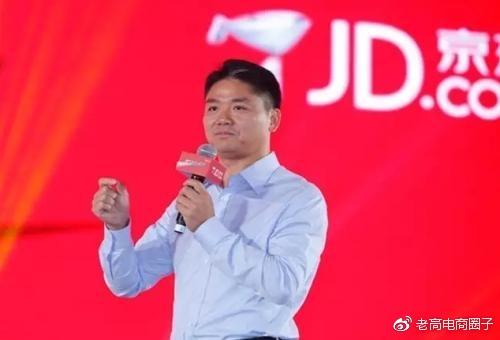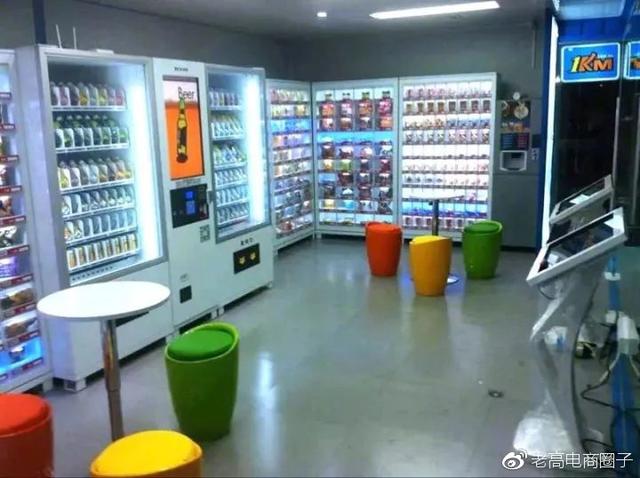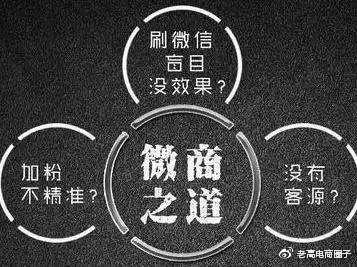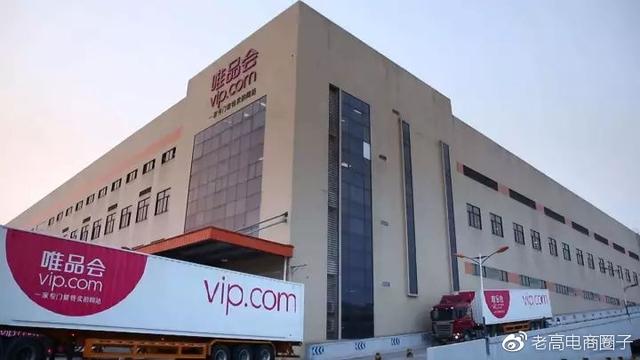The balance in 2017 is less than 30 days. Looking back on the past 300 days, for e-commerce people, this is a year of sadness and joy. There are both the sad ending of famous people and the emergence of newcomers, both the end of traditional e-commerce and new business opportunities for unmanned retail.
Some people leave, some come in, some succeed, and some fail.
This is the inevitability of business laws and the norm of e-commerce development. The wheels of history roll forward along the detoured curve. In the year when the old and new alternate, let us look back on those warm or sad moments together.
1. WeChat’s business dream: mini program + e-commerce
January 9, 2017 is the tenth anniversary of Jobs' release of the iPhone. On the same day, the popular WeChat launched a "mini program". The head of WeChat, Zhang Xiaolong, posted a set of pictures on his circle of friends to convey his tribute to the leader of Qiao.
The advent of mini programs has made many entrepreneurs who are attached to WeChat extremely excited. This kind of mobile phone "app" that "goes out of use" without installation makes some APP operators unable to sleep at night.
Surprisingly, as the progress was progressing, merchants were full of doubts and confusion. No one knows what this thing can bring. Not only can we not divert traffic, but we must also popularize users' usage habits. Especially for some million-level apps, the use of mini programs is still not as smooth as the app. Driven by the entire WeChat team, Zhang Xiaolong opposed the opposition, accelerated optimization, and fought for several months, and finally gave Tencent a satisfactory report card.
From the initial only companies such as China Eastern Airlines, Meituan Dianping, JD.com, Xinhua News Agency, Toutiao, Didi Chuxing, Mobike and other companies have launched "mini programs" to almost all public account service platforms and apps that have mini programs connected. Users' usage habits have also begun to go from downloading apps to using mini programs.
WeChat’s e-commerce dream has taken another step forward. What imagination space will this super app that connects 900 million users bring in 2018? Worth looking forward to.

WeChat launches mini-programs on January 9
2. JD Million Convenience Store: Offline traffic migration
Since milk tea girls no longer become the focus of Weibo, Liu Qiangdong has focused his attention on JD.com.
In early April, it announced that JD.com’s million-dollar convenience stores plan will open more than 1 million JD.com’s convenience stores nationwide in the next five years, half of which are in rural areas. On June 20, the Jingdong Convenience Store in Xin'anzhuang, Renqiu City, Hebei Province officially opened. Within a few hours, all the products of the convenience store were sold out, firing the first shot of the Jingdong Convenience Store.
Thanks to JD.com's strong logistics and distribution, the network has successfully entered the rural market. Therefore, JD.com can easily enrich the product structure of husband-and-wife stores, which has had a great impact on rural e-commerce.
Every appearance of Brother Dong has brought considerable shocks to the e-commerce industry, whether it is busy working as a courier or leading the whole village to become rich and become a village chief. As online traffic becomes more and more expensive and the growth of new users slows down, JD.com's front has expanded from online to offline. If chain stores like All FamilyMart and 7-Eleven harvest offline traffic in first- and second-tier cities, then JD convenience stores harvest traffic in third- and fourth-tier cities. In the long run, rural e-commerce will surely break out, and Alibaba and JD will definitely have a battle.

2017 is a year when JD.com makes full efforts
3. NetEase Yanxuan: The rise of middle-class online shopping
"A good life is not that expensive."
In April 2016, NetEase Yanxuan, an original lifestyle e-commerce brand under NetEase, announced its official launch, becoming an e-commerce brand in the domestic ODM (Original Design Manufacturer) model. Against the backdrop of the supply-side reform tide, NetEase Yanxuan has cooperated with international first-line brand manufacturers to strictly control the production process and provide users with high-quality products.
Ding Lei, who has always been low-key and made a fortune in silence, never expected that on May 23, a public relations manifesto of "To Ding Lei: Can you give entrepreneurs a way out?" was smashed to him. The founder of the founder known as "Towel Brother" accused NetEase Yanxuan of infringement of a towel product. Brother Towel said that NetEase Yanxuan violated regulations and infringed on the word "G20" to describe the product.
This incident pushed NetEase Yanxuan to the forefront. After responding, NetEase, which has always been good at public relations, started a super towel promotion and reduced the price of towels from the original 29 yuan per person to 12 yuan per person. Towels will be sold out immediately.
The crisis has been temporarily resolved, NetEase Yanxuan is also well-known to more consumers, and its reputation has been praised. However, the good quality behind a good life is still the anxiety of the middle class. What more e-commerce practitioners think is: How to create another NetEase Yanxuan in the market monopoly of giants?

The rise of middle-class online shopping
4. SF Express rookies fight each other: if you are harmonious, you will be prosperous, if you fight, you will be damaged.
On June 1, due to the issue of "logistics data interface", SF Express and Cainiao fell into a dispute. The reason for the incident: Cainiao upgraded the entire network's logistics data, but SF Express and Fengchao refused to cooperate, so Cainiao removed the Fengchao interface information on June 1, and SF Express believed that Alibaba was behind this matter. Alibaba asked SF Express, Fengchao and others to join Alibaba Cloud on the grounds of information security, so it closed the Cainiao Logistics data interface.
The two sides fought back and forth, and fought for several rounds. The war spread and burned into other industries, triggering the industry to take sides. JD.com, NetEase, Tencent Cloud, Meituan and others have supported SF Express, and the Tongda Department expressed its support for Ciaojiu after collectively silenced. Seeing that the matter was getting worse and worse, the State Post Bureau finally had to mediate, and the matter was successfully resolved.
This is a battle for the right to survive behind big data, which makes peers frightened. There are no winners in this battle. Although the matter is over, the question of whether to leave the data to yourself or to the platform is still a big problem among private express delivery companies. In the future, the competition for logistics cloud data will be more intense in the field of logistics in the future, but most private express delivery companies have begun to decline.

SF Express’s big data battle
5. Unmanned retail: a new form of e-commerce development
In July, Alibaba released Taobao Coffee at its Taobao Creation Festival, which triggered the concept of unmanned retail. Subsequently, the various forms of unmanned retail became the hot spot for capital to pursue, and it was hailed as a new business model with the use of big data and new technologies.
After all, the hot spot is the hot spot, and the real implementation remains to be tested by the market. On October 25, the first batch of unmanned retail stores that were launched in Shanghai, Binguo Box, was officially closed due to high temperature tests and suspected illegal construction, which gave dreamers who advocated that unmanned retail would replace offline supermarkets.
Although the road ahead is full of thorns, the development of unmanned convenience stores, unmanned shelves and self-service vending machines that automatically service or self-checking settlement, reduce retail dependence on people to a certain extent, reduce consumers' time costs, and improve shopping experience. According to the "2017 China Unmanned Shelf Market Prospects Research Report" released by China Business Industry Research Institute, as of the end of September, at least 16 unmanned shelves have received investment, reaching a maximum of 330 million yuan, with a total financing of more than 2.5 billion yuan. It seems that what should come will come.

Unmanned retail: a new form of e-commerce development
6. Wechat business: a "carnival" directed and acted by extras
As Yun’s fingertips, Youku Speed Purchase, Yunmeng Life and other things were defined by CCTV as pyramid schemes, the myths of making wealth were gradually shattered, and fewer people in their circle of friends were exposed to breasts, facial masks, luxury cars, and groups to Japan, South Korea, and Malaysia at any time. The micro-businesses in 2017 were thunder and raindrops.
It seems that the monthly turnover exceeds 100 million yuan and the monthly salary of 100,000 yuan is no longer possible. It is just that agents are becoming increasingly difficult to recruit, and no one in the circle of friends is concerned about it. Some of the micro-businesses who shouted that everyone was CEO turned to Taobao again, some returned to work in the company, and some continued to persevere.
The popular micro-business has caused controversy in this hot industry. CCTV's exposure, media exposure, public rejection, WeChat's official crackdown... So many people at the bottom who want to change their destiny through micro-business seem to be shattered overnight. Once tight, you will die, and once you let go, you will be in chaos. This is the current situation of this industry. Despite this, the industry is still booming.

WeChat business
7. Vertical e-commerce: "Small and Beautiful" after the dividends cease
Vertical e-commerce APP has been on the rise for two or three years, Xianyu has more than 15 million monthly active users, and e-commerce platforms such as Mogujie and Xiaohongshu have gradually become big names in the market in segmented fields. The mobile Internet has divided people more closely, and the characteristic of "people are divided by groups" is becoming more and more obvious.
The demands of niches are gathering through mobile phones and becoming "popular" and the circle also brings personalization and more sticky. JD.com has been promoted from 3C to a full-category e-commerce platform with a market value of US$40 billion, spanning 16 years. When the increase in mobile Internet users has stopped growing, various platforms are plundering users with amazing price wars. While comprehensive malls such as Taobao, Tmall, and JD.com have already occupied the market, they are competing with these giants. The result is conceivable.
Those who can get up have already arrived ashore, and those who are still drifting are still rising and falling. No one seems to know whether the future is light or dark.

Vertical e-commerce: "Small and Beautiful" after the dividends cease
8. New retail: an upgraded version of e-commerce
"In the next ten or twenty years, there is no such thing as e-commerce, only new retail." In October last year, Jack Ma made an amazing statement at the Hangzhou Yunqi Conference. For a time, discussions about new retail came one after another. Online and offline integration, offline enterprises must go online, and online enterprises must go offline; eliminate inventory, make inventory management better, and reduce corporate inventory to zero... The views on new retail have never stopped.
At the end of October, JD.com joined hands with Tencent to launch "Jingteng Borderless Retail". In mid-November, Alibaba invested 22.4 billion Hong Kong dollars in Gaoxin Retail. Coincidentally, Amazon also acquired Whole Foods for US$13.7 billion this year. The retail war is becoming increasingly fierce.
As everyone's understanding of e-commerce, traffic and operations continues to deepen, in order to gain greater development space and competitive advantages, a larger scope and deeper layout is inevitable. The continuous development of technology will provide new concepts, new models, new technologies and new momentum for the further development of China's new retail.

New retail: Upgraded version of e-commerce
9. Double Eleven: Carnival of hundreds of millions of people
At 0:03, Alibaba's Tmall's transaction volume exceeded the first 10 billion yuan; at 9:04, Tmall's transaction volume broke through 100 billion yuan, far exceeding last year (it took nearly 19 hours to reach 100 billion yuan in 2016, 10 hours more than this year). At 0:00 on November 12, 168.2 billion yuan of transaction volume was reached.
In addition to watching a party that is more exciting than the Spring Festival Gala, a series of glamorous numbers with Jack Ma’s Baba, in recent years, there have been more and more doubts about Double Eleven, and the problems of extending the pre-sale period, merchants’ losses selling, inventory cleaning, finishing goods processing, logistics backlog... are becoming more and more serious.
Double Eleven has reached its ninth year. When will the GMV rise to an end? Is this a "irrational consumption" or is it a condolence for merchants to swipe orders in order to grab the main venue? Before Double Eleven, Tmall basically maintained acquiesce to the phenomenon of brush volume. Since in order to make volumes, it is necessary to simulate real orders, and the most important part of Tmall's platform's own profit is "deduct points". Before the shopping festival, merchants secretly browse volumes and virtualize massive sales, and Tmall also make a fortune. This is a good thing for both parties, so why not do it?
From the platform to the merchant, from the merchant to the consumer, is this a collective carnival or mutual benefit for the whole people?

Double Eleven: Carnival of hundreds of millions of people
10. Vipshop: The loneliness behind the end of the fireworks
After the Double Eleven carnival, e-commerce companies posted their data: JD.com's sales for 11 days from November 1 to November 11 were 127.1 billion yuan, Tmall sales were 168.2 billion yuan, and Suning's online sales for Double Eleven were nearly 11.022 billion yuan. Vipshop, which once ranked among the third largest platform for e-commerce and has hundreds of millions of users, only announced in one news: the order count in one hour exceeded 2 million, and the sales exceeded 100 million, the fastest time in history. No accurate data was released.
When JD.com and Tmall are all planning women's clothing, it makes people wonder whether Vipshop, which once was as brilliant as fireworks, ended lonely after a lonely life, or has the opportunity to turn the tide and start its own growth path again? Faced with the plunder and expansion of giants, Vipshop's market share has been shrinking, and the quality of authentic products has been repeatedly questioned. Does Vipshop have the courage to make drastic reforms? Still a mystery.

Vipshop: The loneliness behind the end of fireworks
Conclusion
2017 is about to enter history, and e-commerce in 2018 is still confusing. Whoever is the dark horse will be eliminated. Will the "Black Swan Event" happen?
In this disorderly and uncertain era, all this is both tempting but also deeply powerless. But no matter what, this era has given entrepreneurs more business possibilities.
To borrow a speech by Jack Ma at the Zhejiang Business Conference a few days ago: Today's China is the best era of doing business. To run a business, as a leader, is to build momentum, take advantage of the situation, and follow the trend. It is difficult to build momentum, but it is important to follow the trend and take advantage of the momentum. So today's big wave of technological revolution is a huge trend that every e-commerce person can take advantage of.
Yes, in 2018, "the momentum" is artificial.
Thank you for your attention and support to Laogao E-commerce Club . Please indicate the source of the reprinting website www.shxuanming.net
Click to register to apply to join the well-known e-commerce network - Laogao E-commerce Club. Any merchants from all over the country, Tmall merchants, Taobao Crown Store, Jinguan Store, and other e-commerce platform merchants can apply to join!













![#Laogao E-commerce Newsletter# [May 26 E-commerce Evening News Brief]](/update/1622019446l300991583.jpg)


 EN
EN CN
CN
